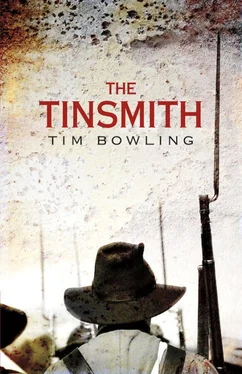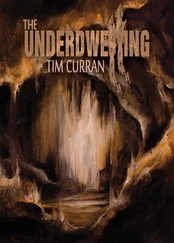The horses nickered softly. From the near distance floated a high, tinkling sound, almost like cow bells. Except for the stench and corpses, it was all very bucolic. The senior officer—more than a colonel but not a general: Greaver had not yet made a thorough study of the command insignia, just enough to know the top price when he saw it—had a prominent cleft chin and heavy side whiskers. He was at least sixty. His voice had a pleasing gravity, and he stood very still.
“We have information that you have been embalming more than soldiers here. That you’ve been embalming civilians.”
If not for his admiration of the officer’s tone and carriage, Greaver would have been stunned by the statement. As it was, it discomposed him enough that he shifted his weight from one foot to the other before replying.
“Sir, your information, I’m afraid, is inaccurate. That is to say, I’m willing to perform my services, as a general rule and at a very fair price, for anyone in need of them. But here…”
The embalmer looked slowly across the battlefield, his dramatic gesture grossly interrupted for him by the sight of the horse and wagon that had almost reached his tent.
Two men were seated on the board, the tinkling sound grew louder.
“Here I have not encountered a member of the public in such need.”
Greaver stared at the wagon. What competitors were these to ride so brazenly into his operations? His temples throbbed. He wanted to call out to Tomkins for assistance, but that would be as effective as calling to the bodies in the coffins.
The otterlike little man stepped forward. He was barely taller than a small boy but well into middle age. A few white whiskers showed in his trim beard. His air was both cool and tense, as if he knew what was going to happen but not how others would respond.
“The information is reliable,” he said. “You have had in your possession the body of a farmer named Orlett. Who brought it to you? And where is it now?” He pointed toward a stack of open coffins, the zinc reflecting the sun in daggers. “Here?”
“Gentlemen.” The throbbing in Greaver’s temples moved behind his eyes. He touched his glasses delicately but did not remove them. The officers, motionless, glared. Greaver heard the wagon stop nearby, the clatter of men getting down. He could not define the greater threat. After all, the army wanted embalming surgeons. Hadn’t he already done much service to the families of the brave men fallen in the nation’s cause? Not as much as others, perhaps, but then, he had only begun. No, he could not perceive the officers as a threat. The otterlike man and the men from the wagon, on the other hand—Greaver did not like them spying on his operations. No doubt they wanted to look at, perhaps even steal, a bottle of his special embalming solution.
“Gentlemen, I assure you…” Greaver stepped to one side of the trio and started toward the wagon. The younger officer, red-mouthed, blue-eyed, stopped him by holding out one gloved hand.
Now Greaver grew indignant. Civilians indeed! Had he come to this battlefield, risking his own life, to use his skill on civilians? Why, he could have stayed safely in the city and done that.
“I assure you that I have preserved only soldiers, and many officers included, under this tarp. These hands”—he held them out—“have touched no one else.”
The officers and the little man bent their heads together in a cloud of whispers. Greaver seized the opportunity to look for the wagon men. To his dismay, only one appeared; what about the other? Greaver turned so quickly toward the table under which he kept his bottles of fluid that he became dizzy. He put his foot down hard to regain his balance, and the sound brought the three heads up.
Very dignified, the older officer said, “We will make a careful search.”
Despite himself, the embalmer almost smiled. That’ll flush Tomkins out of his hole.
But the satisfaction was fleeting. An amused voice boomed out from behind him.
“Hello, Pinkerton. Are you finding a nest of spies among these corpses now?”
The man at the tripod had suddenly come up, his long coat open, his full beard split at the bottom. The laughter in his eyes dazzled like the sunlight on zinc.
The little man scowled. He looked at the burly, jesting figure and spoke low. Greaver could not hear the words. But the heavily bearded man did not stop smiling as he nodded.
“Aye, I thought you’d have your eye on that business. But you weren’t there, Alan. It was quite a sight. If it hadna been so dark at the time…” The bearded man paused and then made a dismissive gesture with one hand. “There’s plenty of killing here as it is. One corpse, more or less, canna change the war. But listen, Alan…” He gripped the other’s elbow and put his great buffalo head very close. “I need to use the wire. I have to get more plates sent. Right away.”
The little man frowned. “I can’t promise, Alex. If you haven’t noticed, that was a great battle yesterday. Communication with the White House is of the highest priority.”
“But, Alan.” The bearded man’s voice rose. “One message! Very short!”
The younger officer appeared from behind the stacked coffins and tapped Greaver’s shoulder.
“Come with me,” he said.
Greaver followed, his head swivelling back, still drawn by the bearded man’s passion, a passion Greaver understood and respected—ambition. The tremble in the voice, the fire in the eyes: fortunately, the man was not an embalmer. Greaver had figured out that the tripod was a part of a camera, that the reference to plates indicated photography—he knew a little about the latter, as he had considered having a carte de visite made for business purposes. Indeed, once these mistaken officers departed, perhaps the bearded man could be persuaded to take a portrait? Perhaps even of a body being prepared for the eternal rest? Ah, but the cost. It might be prohibitive. Especially with the Rebel officers not being sold yet.
But Greaver had to contend with the two Union officers first. They stood ramrod still, eyes as cold as somatic skin, looking down at the lid of a closed coffin.
Greaver walked up slowly, stopped, and unlooped his glasses. The day was too warm; he couldn’t keep the sweat off his lenses.
“One moment, gentlemen.” He pulled out his handkerchief. A moment later, his glasses back on, the officers as motionless as what lay in the coffin, he read the words he’d written on the lid: Colonel. Army of Northern Virginia . Greaver straightened up. The silence was broken only by the cheeping of a bird. “Yes?”
“Open it,” the older officer said.
“I beg your pardon?”
The younger officer, equally serious, said, “Do you expect us to believe that you’re in the habit of embalming the enemy?”
“But, gentlemen…” Greaver shaded his eyes from the sun as he looked up at them. His hat gave little protection; he felt the greasy rim of it on his brow. The otterlike man sidled up. His shadow stuck leechlike to the others.
Greaver felt dizzy but managed to gather his thoughts and express them slowly. “If I was hiding a body, would I inscribe such words on the lid? That would be foolish. And I am not, gentlemen, a foolish man.”
“Do you mean to say,” the older officer said, “that there’s really a Rebel colonel in this coffin?”
Greaver flushed, taken aback. It did look foolish, embalming enemy soldiers and not being able to trade them. He should have known better. But, after all, he was bound to take a few missteps in his first great battle. “Yes,” he said, thinking quickly, “I thought perhaps, during the truce, I could use the colonel to recover one of our fallen officers.”
“Very noble of you.” The younger officer wore an ugly sneer. His voice hardened even more. “Open it!”
Читать дальше












